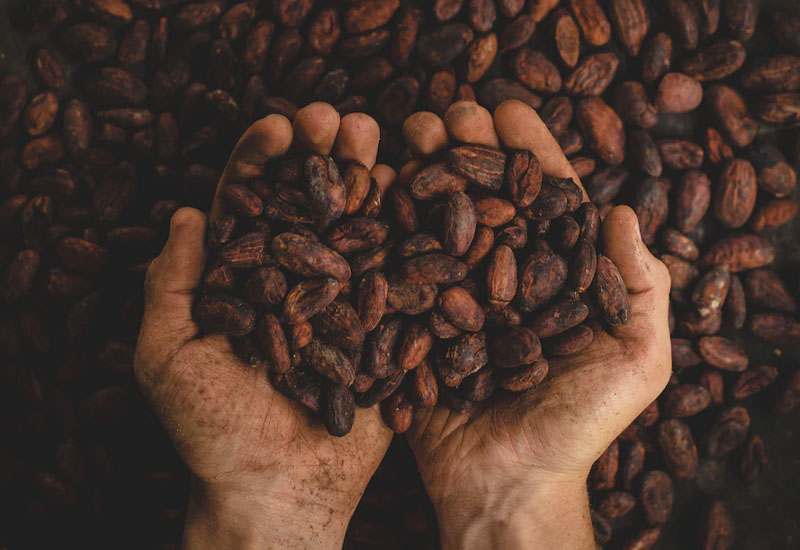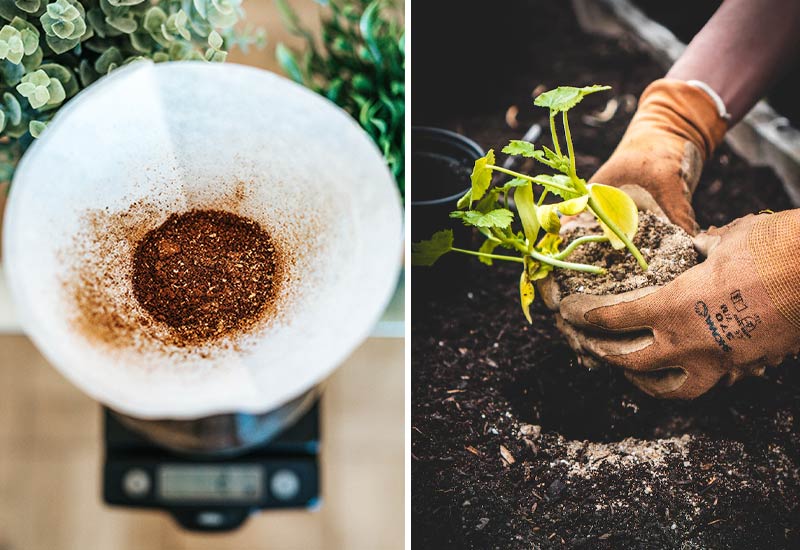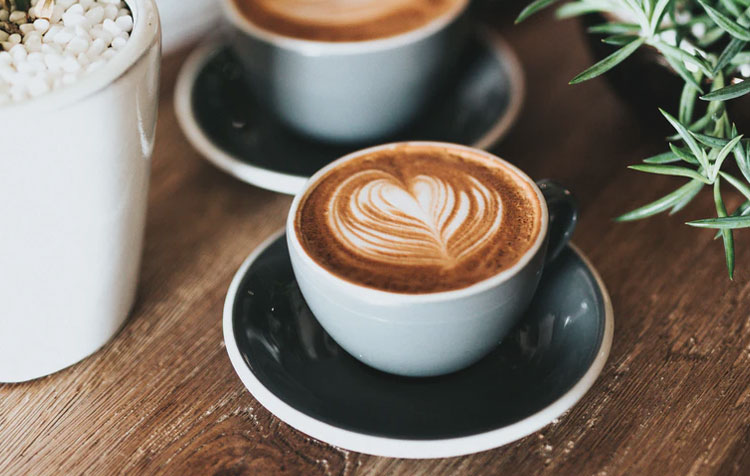You want to drink and cook coffee sustainably? Then you've come to the right place! Bean coffee, cappuccino, espresso, mocha, Americano, latte macchiato, instant or filter coffee - Germany is a country of coffee drinkers. According to a representative Study of the German Coffee Association Germans consumed in the year 2021 169 liters of coffee per capita - And the trend is rising. Not without reason - after all, hot drink lifts the mood, increases the drive and increases the ability to concentrate.
But every sip can also contribute to the exploitation of people and the destruction of nature. Around 80 percent of the world's coffee is produced by 25 million smallholder families - who earn less than 2 dollars a day.₁ In addition, around 140 liters of water - almost a bathtub full - are used to grow one cup of coffee.₂ No one has to give up their coffee for breakfast or on the train. But everyone can make sure they enjoy this wake-up drink more consciously and sustainably.
In this article, I would like to provide you with valuable tips for fair and environmentally friendly coffee consumption. Find out now how you can cook and drink your coffee sustainably and achieve a noticeable, positive effect for people and nature. Let's go!
In advance you can find a short overview of the tips here:
- Drink from cup and reusable cup
- Set on ecological coffee maker and grinder
- Enjoy your coffee with plant milk
- Stir with a reusable spoon
- Prefer Fairtrade coffee from organic farming
- Use coffee beans instead of coffee capsules
- Sweeten your coffee environmentally friendly
- Use a reusable coffee filter
- Enjoy your coffee with vegan cookies and cakes
- Use the remaining coffee grounds in the household
1. drink from cup and reusable cup

Round 2.8 billion disposable cups German citizens use for their ToGo coffee every year - that's an average of 34 cups per capita, most of which end up in public trash cans.₃ Crazy numbers. Especially when you consider that by preferring a cup or a Reusable cup could theoretically also be 0.
It goes without saying that you should drink your coffee in the comfort of your own home or office. do not drink from a plastic or paper cup should, if possible live sustainably and want to act. But what can you do on the road to avoid the disposable waste caused by Coffee-ToGo cups? If possible, drink your coffee in the local café and not ToGo - at many establishments, you can also still Save money sustainably. In addition, you will also get to know famous coffee houses or your new favorite café around the corner.
Tip: If you ever have family over or want to take larger quantities of coffee with you when you're out and about, you should get yourself a long-lasting coffee pot or thermos flask. Experience shows that it's worth spending a few euros more here - both for the environment and for your wallet.
2. set on ecological coffee maker and grinder
If you drink coffee on a regular basis, then you should be making your refreshing hot drink with modern technology. A fully automatic coffee machine with an integrated grinder has both ecological and, above all, financial benefits. The purchase may seem a little more expensive, but the preparation is much easier. much cheaper compared to the capsule coffee.
The latter is in fact a classic marketing productthat ultimately allows manufacturers to sell lower volumes at higher prices - and earn a profit margin that makes dollar signs sparkle in their eyes. By the way, you're also more dependent on the brand for your coffee pods because they can only be used with certain machines.
When choosing, make sure that the device has the best possible low power consumption has and automatically turns off a few minutes after use. Of course, it is advisable to use the machine to decalcify and clean regularlyso that it provides you with its services for as long as possible.
Alternatively, you can also use a classic Coffee grinder in combination with a coffee maker use. This form of manual preparation is not only meditative, but also guarantees you the most aromatic coffee possible.
3. enjoy your coffee with vegetable milk
Have you ever asked yourself, Why vegans do not drink milk? The answer is not difficult. For example, because also for milk animals have to suffer and die, because air, soil and water are polluted by the Factory Farming be burdened because the Rainforest cut down to be able to produce animal feed - and also because there are healthier alternatives.
Whether Oat milk, rice milk, almond milk or soy milk - the milk shelf is fortunately overflowing with plant-based substitutes for conventional, animal-based milk these days. Most of them are even available in a barrista edition, ideal for true coffee fans.
4. stir with a reusable spoon
Since I have been as live plastic freeI have hardly come across a disposable product that is more superfluous than a plastic stirrer. It is only in use for a few seconds and then lands directly in the trash can. Rather do without it and replace it - for example with a washable stainless steel spoon. No waste - and the coffee still tastes good 🙂
5. prefer fair trade coffee from organic farming
To ensure that coffee farmers are paid fair wages, that they generally enjoy fair working conditions and that child labor is excluded, you should consciously choose Fairtrade coffee from organic farming set. In the latter, for example, chemical additives, synthetic pesticides and the use of environmentally destructive pesticides are dispensed with.
"Tea warms the heart, coffee warms the soul."
Unknown
However, environmentally friendly coffee is preferable not only because it provides a cleaner conscience, but also because it is more intense aroma and flavor notes Promises. If you already find conventional coffee aromatic, vibrant, floral, berry-like, and spice-like, wait until you enjoy real, organically grown Fairtrade coffee.
Tip: By the way, you can recognize Fairtrade products by the now widely used Fairtrade seal on the packaging.
6. use coffee beans instead of coffee capsules

The German Environmental Aid has calculated that in 2019 Germans will About 3.4 billion coffee capsules consumed, generating gigantic amounts of plastic, aluminum and paper waste that are difficult to recycle.₄
And all this despite the fact that the waste could be avoided easily and almost completely. Not through organic or reusable coffee capsules and pods, for example, but quite simply through modern fully automatic coffee machines, a French Press or an espresso pot - and the preference for aromatic bean coffee over coffee capsules.
7. sweeten your coffee environmentally friendly
For health reasons, of course, I would advise against it - but many people sweeten their coffee. Maybe you are one of them? If so, then you should preferably regional cereal sugar, as well as sugar from sugar beets prefer. Both do not have long transport routes. Low-calorie stevia, for example, is also an ecological alternative.
8. use a reusable coffee filter
Even conventional disposable coffee filters are only used for a very short time before they become unusable. In the sense of the Zero Waste Lifestyle there is also a much more sustainable alternative, such as a reusable filter made of stainless steel or a washable counterpart made of hemp. The application works as usual - only the throw in the trash can is omitted. If you want to drink and brew your coffee more sustainably, you should definitely take this tip to heart.
9. enjoy your coffee with vegan cookies and cakes
I have already explained why animal milk is not only harmful to animals, but also to the environment. Also in cookies and cakes, which we like to eat with coffee, are often Milk and dairy products, such as butter and cream, as well as Eggs Of chickens.
If you want to drink coffee sustainably, you should use the resource-intensive "Avoid "detour animal and focus on pastries and cakes made from purely vegetable ingredients.
10. recycle the remaining coffee grounds

You can not only make and drink your coffee sustainably - but also recycle it! After the preparation remains the so-called coffee grounds, the ground rest of the coffee beans, back.
This is extremely rich in nutrients and can, for example, still be in the garden as fertilizer, as odor remover in the kitchen or also in the bathroom as a scrub be of use. At Coffee grounds applications you will learn how exactly this works and where exactly you can still use the leftovers of your coffee.
Drink and cook coffee sustainably, made easy!
Whether it's the coffee maker, the type of coffee, the coffee mug, the milk, the cookies or even the stirrer - you're incredibly many possibilities to enjoy your coffee in a more environmentally friendly and sustainable way in the future. From now on, simply make and order your coffee Fairtrade and as waste-free as possible - and use the coffee grounds that are left over in the household.
The implementation of all the tips from this article is, according to experience, very easy and can really be done stress-free from one day to the next. Take the opportunity at the next coffee klatsch to set an example in terms of sustainability.
Do you have any questions, suggestions or further tips for drinking and cooking coffee sustainably? Then I look forward to your comment.
Stay sustainable,

PS.: Is coffee actually healthy? I have devoted myself to this question in another article. Feel free to have a look!
References:
₁ Fairtrade Deutschland e.V.: Fairtrade coffee - How fair trade coffee works, available at https://www.fairtrade-deutschland.de/produkte/kaffee/hintergrund-fairtrade-kaffee. [14.09.2022].
₂ Original Food GmbH: 140 liters of water for a cup of coffee? Not with us, available at https://originalfood.ch/140-liter-wasser-fuer-eine-tasse-kaffee-nicht-mit-uns. [14.09.2022].
₃ H. Jahberg; Tagesspiegel: 2.8 billion disposable cups a year:Coffee-to-go should soon work without waste (as of May 21, 2019), available at https://www.tagesspiegel.de/politik/coffee-to-go-soll-bald-ohne-mull-funktionieren-4643167.html. [14.09.2022].
₄ Deutsche Umwelthilfe e.V.: Kaffeekapseln, available at https://www.duh.de/projekte/kaffeekapseln. [14.09.2022].






